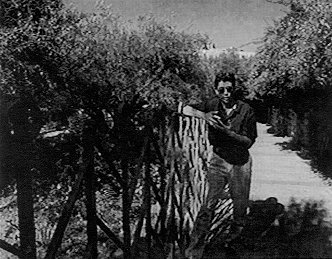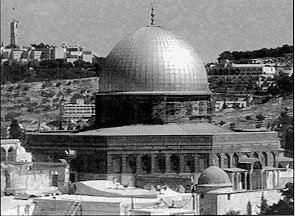CAIN Web Service
Speak Your Piece
Exploring Controversial Issues
OFF THE WALLS
A Guide for Teachers, Youth and Community Workers
|
Religion
We had fed the heart on fantasies,
The heart's grown brutal from the fare;
More substance in our enmities
Than in our love;
from The Star's Nest by the Window by WB Yeats
John Kelly speaks from Massada, where in 70AD hundreds of Zealots
chose to kill themselves in a mass suicide rather than submit
to the Roman army. He talks about the holy city of Jersusalem/
El Quds and its religious significance through the ages for Christians,
Jews and Muslims.
The studio debate explores religious identity, bigotry and prejudice,
and the experience of doubt.
The drama profiles conflicting views about nationality and religion,
highlighted in a tense confrontation between Ken and Pat. |
 |
Garden of
Gethsemane |
| |
| Wars have been here for centuries. Wars about territory, wars about God. |
|
Before viewing...
In small groups, discuss the following questions:
1. How important is religion in your life and in the life of your
family?
2. Do you think that religion has contributed to conflict in Northern
Ireland?
3. What contribution does religion have to make in resolving conflict
in Northern Ireland?
|
 | Activity one This activity is called a walking debate and works best with at least ten people. Space is required for the whole group to stand in a line.
|
| |
| Walking Debate Label one end of the room agree and the other disagree.
|
| |
|
- Arrange participants in a line initially in terms
of height or birthdate.
- Read out the statements below. Ask participants to respond by choosing a place along the
line depending on their strength of feeling about each statement.
- Interview the participants at the various points on the line and allow them to discuss
their positions with each other.
|
| |
|
- religion is important to me
- Protestants and Catholics belong to different religions
- the Churches are out of touch with young people
- schools in Northern Ireland should be integrated
- in Northern Ireland there is too much religion and not enough Christianity
- religious people are less tolerant
- God is on 'our side'
- the Churches could do more to bring peace to Northern Ireland.
|
 | Dome of the Rock,
Jerusalem
|
| |
| … everyone believes that God is on their side.
|
| Does religion make people more or less tolerant?
|
| |
 | - It's like they're afraid of anything different, they're afraid of change. (Bob)
- So what do you call your dog? (Pat)
|
| |
 | Activity three This activity is designed to sensitize participants to the experience of discrimination. The space should be arranged so that there are a few comfortable seats, but most people have to sit on the floor.
|
| |
| Discrimination |
| |
| 1. As participants enter the room direct each person to sit either on a comfortable seat or the floor. Your decision about where each person sits should be based on some random distinction, for example, eye colour or first letter of name.
|
| |
| 2. The minority should have the comfortable seats. Treat those seated with the utmost respect and allow some form of privilege. Adopt a contemptuous attitude towards the others.
|
| |
 | 3. After an appropriate length of time divide into small groups and discuss how individuals felt about the way they were being treated.
|
| |
| 4. Why is religion sometimes a basis for discrimination? Each group could consider what factors contribute to discrimination and this may lead to an agreed definition of the term.
|
| |
| 5. Have individuals experienced other forms of discrimination? Does it exist in the school, college, club or organisation to which you belong?
|
Worksheet 3
Religion
Activity two - statements as a basis for discussion
|
| Ten things that Catholics say are different about Protestants
|
| 1 |
. |
| 2 |
. |
| 3 |
. |
| 4 |
. |
| 5 |
. |
| 6 |
. |
| 7 |
. |
| 8 |
. |
| 9 |
. |
| 10 |
. |
| Ten things that Protestants say are different about Catholics
|
| 1
| . |
| 2
| . |
| 3
| . |
| 4
| . |
| 5
| . |
| 6
| . |
| 7
| . |
| 8
| . |
| 9
| . |
| 10
| . |
Return to Contents
|